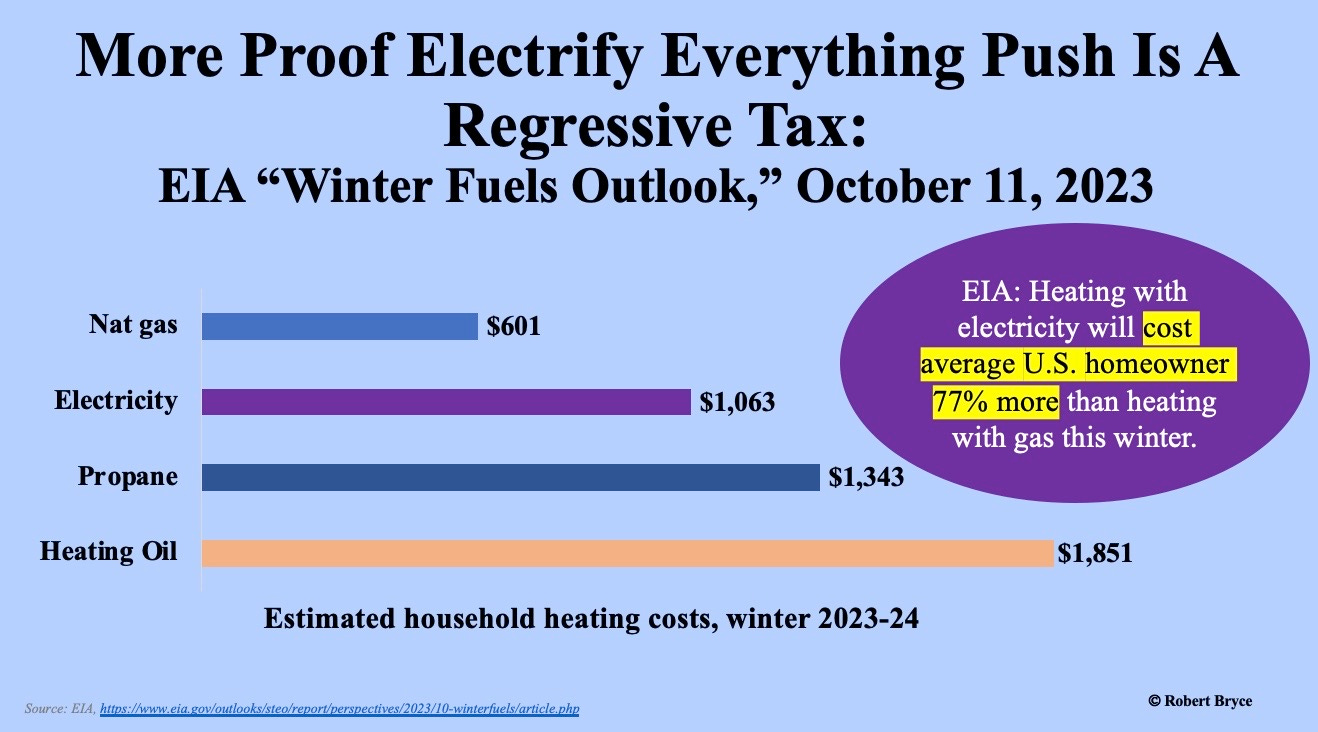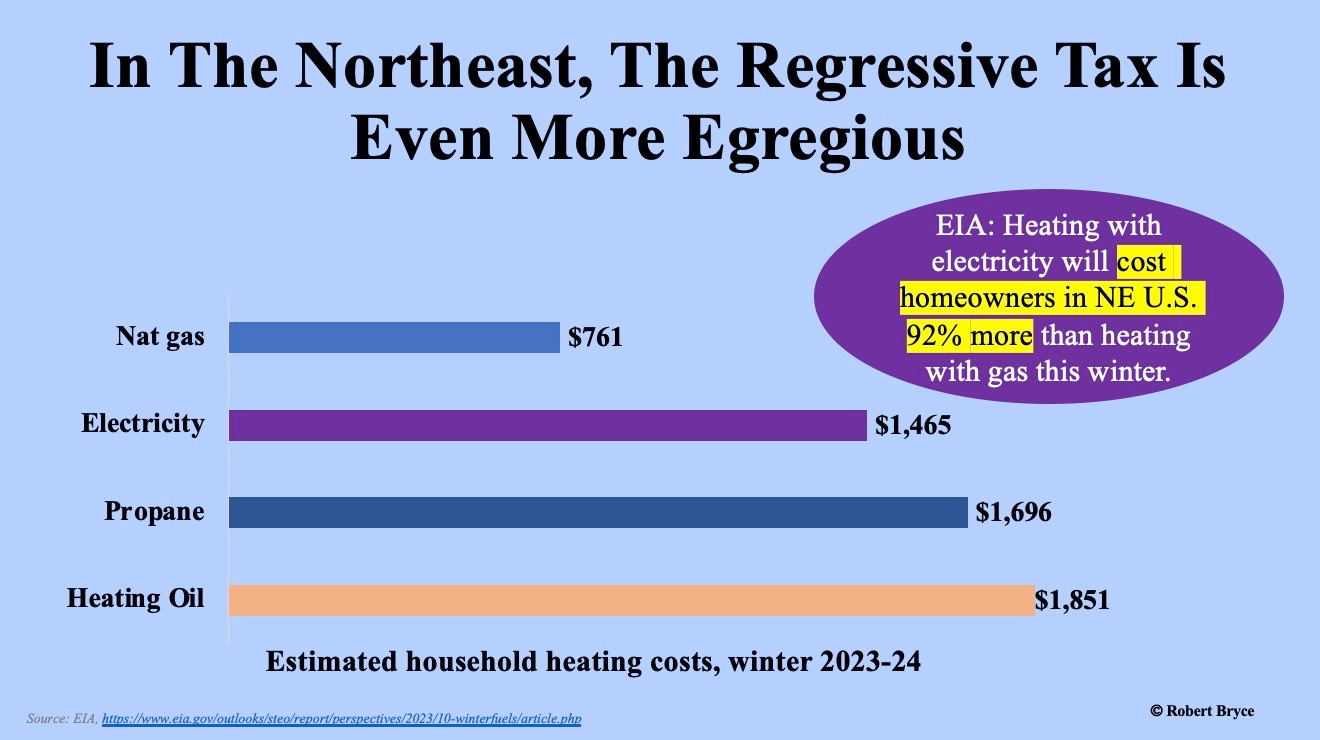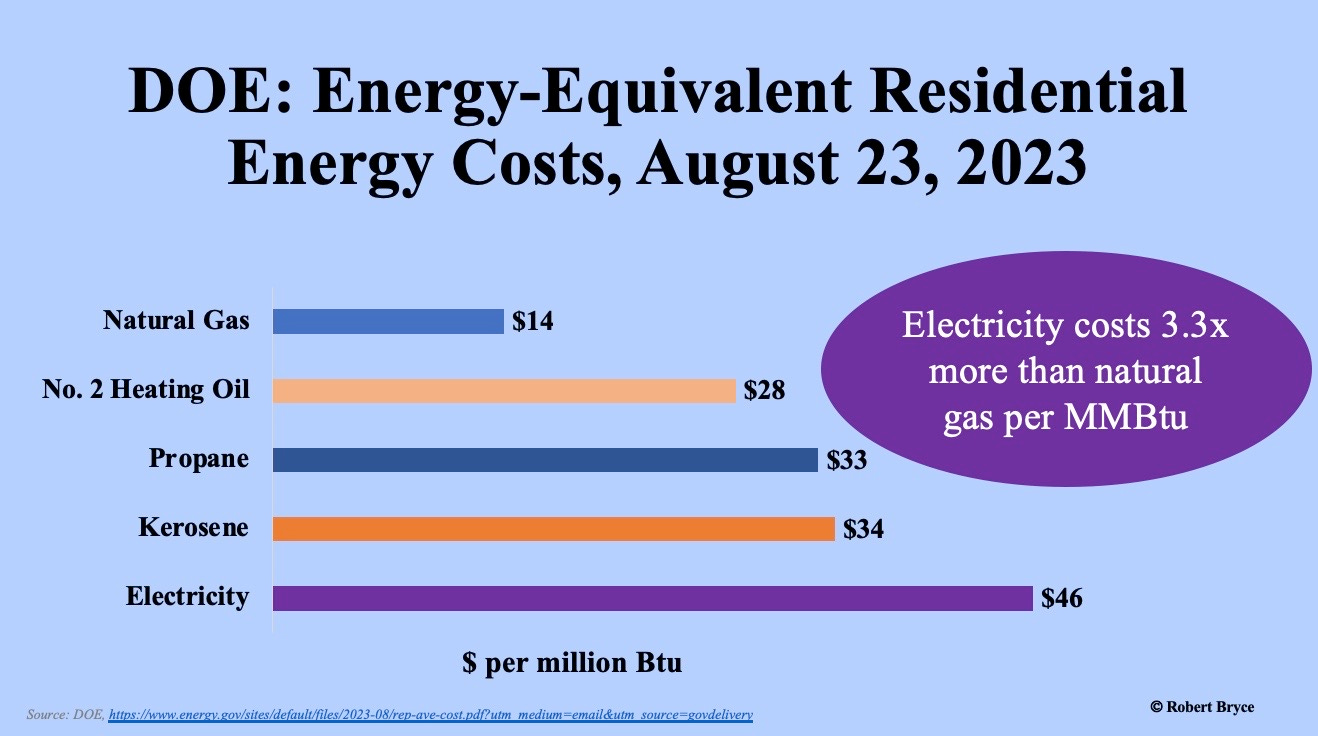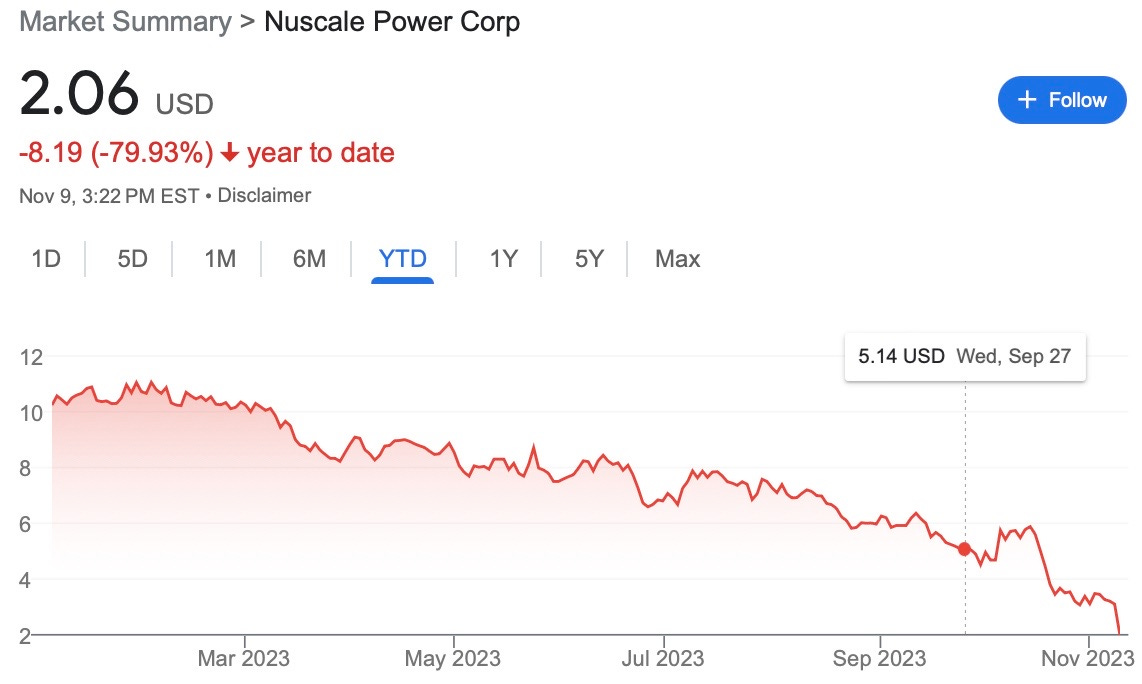Federal Data Shows, Again, That The Electrify Everything Push Means Higher Energy Costs
EIA Winter Fuels Report: heating with electricity will cost 77% more than heating with natural gas; NuScale SMR project gets cancelled
Some of America’s richest NGOs are pushing policies that ban the direct use of natural gas in homes and businesses. While they claim the ban on gas is needed to address climate change, these bans will result in dramatic increases in energy costs and impose a regressive tax on the poor and the middle class. More proof of that came last month when the Energy Information Administration released its Winter Fuels Outlook for 2023-24.
The report shows that an average U.S. homeowner who uses electricity to heat their home will pay about $462 more this winter than ones who use natural gas. That means heating with electricity costs about 77% more than heating with natural gas.
In the Northeast, the agency estimates consumers who use electric heat will pay almost twice as much ($1,465 versus $761) as those who heat with gas. Furthermore, the EIA numbers show that in every part of the country — Northeast, South, Midwest, and West — heating with gas is cheaper than heating with electricity. In the South, heating with gas will cost about $494, while heating with electricity will cost $1,001.
This is the second Department of Energy report published over the past three months that shows the electrify everything push will result in higher energy costs for consumers. The EIA’s Winter Fuels Outlook report was published two months after the DOE released its annual survey of residential energy costs. As I explained on August 29:
last week, the Department of Energy published numbers that show, yet again, that the electrify everything push is, in reality, a regressive tax. The data, published by the Office of Energy Efficiency and Renewable Energy, forecasts the “representative average unit costs of five residential energy sources for the year 2023.”
Here's the punchline: On an energy-equivalent basis, electricity will cost 3.3 times more than natural gas this year. The forecast found that electricity will cost about $46 per million Btu while natural gas will cost about $14. The DOE numbers, which should have been published six months ago, gut the claims being made by NGOs, and in the White House press releases, that the electrify everything push will “lower energy costs.” The exact opposite is true.
To be clear, none of these findings are new. The representative average unit costs published annually by the DOE have consistently shown that using natural gas directly in the home is far cheaper than using electricity. I wrote about this regressive energy tax in Forbes back in 2021. The DOE’s 2019 numbers can be found here. The 2009 numbers are here. What’s different now is that the electrify everything push is being pushed at the highest levels of the U.S. government and by lavishly funded dark money groups.
I went on to point out that the NGOs pushing bans on natural gas have combined budgets totaling more than $800 million per year.
There’s no doubt that the Sierra Club, Rocky Mountain Institute, Rewiring America, Building Decarbonization Coalition, and other groups behind the electrify everything effort are having success. According to the Sierra Club, 76 communities in California have banned or restricted the use of natural gas. In addition, bans have been enacted in Seattle, New York, and Boston. These bans are the result of a coordinated effort that began four years ago and has been supported by the Rockefeller Brothers Fund. Earlier this year, Energy In Depth reported on a 2019 meeting “which paired dozens of high-ranking officials with green energy groups to devise ways to accelerate the elimination of natural gas in their communities and electrify homes and buildings.”
According to the EIA, about 61 million American homes are heated with natural gas, and about 56 million rely on electricity for heat.
Before concluding, I will reiterate two points I have made before. First, as Glenn Ducat points out in his new book, Blue Oasis No More: Why We’re Not Going to “Beat” Global Warming and What We Need To Do About It, burning natural gas directly “is at least twice as efficient and emits about half as much CO2 as processes that use electricity produced from fossil fuels. Converting process-heat applications to electricity before the electricity grid is completely carbon-free will increase CO2 emissions.”
Second, the electrify everything push is terrible for energy security. The first rule of energy security is to have diversity of supply. It makes no sense — none — to put all of our eggs in one energy basket. Yet, that’s precisely what the electrify everything crowd wants to do. Even worse, they want to do it when our electric grid is cracking under existing demand, and regulators and market watchers, including the Federal Energy Regulatory Commission and North American Electric Reliability Corporation, are warning of reliability problems on our electric grid.
The goals of policymakers should be to ensure that energy is affordable, reliable, and resilient. Trying to electrify everything will achieve the opposite.
NuScale Power’s Idaho Project Gets Cancelled
On Wednesday, NuScale Power and the Utah Association of Municipal Power Systems announced they were canceling plans to build a set of six 77-megawatt reactors near Idaho Falls, Idaho. The same high interest rates and increased commodity prices hurting wind and solar projects also hurt nuclear energy. In January, the company announced that it was increasing the expected cost of electricity from the project from about $60 per megawatt-hour to nearly $90 per MWh.
This cancellation is lousy news for the U.S. nuclear sector. It’s particularly painful for NuScale’s investors. In January, NuScale became the first company to get its design for a small modular reactor approved by the Nuclear Regulatory Commission. That process took six years and cost more than $500 million. This cancellation also shows that nuclear energy’s comeback won’t be quick, or cheap, or easy. Proof of that can be seen in NuScale’s stock price (ticker: SMR), which is down 80% this year.
Please click that ♡ button, subscribe, and share.
Check out the latest Power Hungry Podcast. This week, I talked with my friend, Travis Fisher from the Cato Institute, about electricity markets and the “Californication” of our electric grid.
Thanks.









Robert, Yes, electric energy costs 3.3 times as much as heat energy from burning natural gas IF that electricity is used for RESISTANCE HEATING in space heaters or electric baseboard heaters you might find in old motels. Electric energy is more valuable and more versatile than heat energy. Heat pumps can convert 1 MMBTU of electric energy into about 3 MMBTU of heat energy, wiping out the 3.3X factor you quote. However, heat pumps have a high capital cost and lose their 3X efficiency gain up here in northern New England. Furthermore, electricity generation is not low-CO2, unless the power comes from nuclear, hydro, solar, or wind sources. The largest, fastest growing source of US electric power is burning natural gas, and on average it takes 2.3 MMBTU of natural gas to generate 1 MMBTU of electricity, virtually wiping out the gain from the capital investment in a heat pump. You might as well have burned the natural gas at home, rather than converting it to electricity, transmitting it, then powering. heat pump with it.
Yes, they seek to "impose a regressive tax on the poor and the middle class. " In the name of progressivism. They are also bringing us race wars with their new eugenics -- everything is determined by skin color, dontcha know.... And infinite genders and pronouns for the kiddies. Progressives fail every time, on everything.